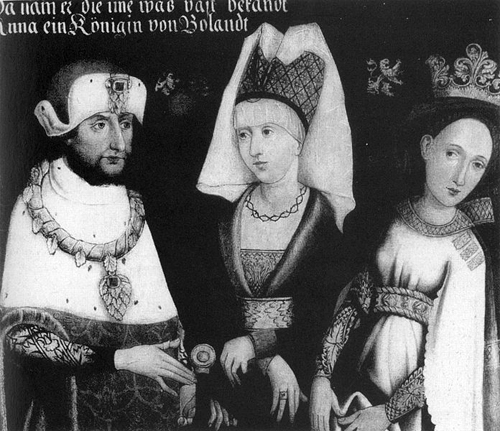Louis succeeded his father Otto as Duke of Bavaria in 1253. When the Wittelsbach country was divided in 1255 among Otto's sons, Louis received the Palatinate and Upper Bavaria, while his brother duke Henry XIII of Bavaria received Lower Bavaria. This partition was against the law and therefore caused the anger of the bishops in Bavaria who allied themselves with king Otakar II of Bohemia in 1257. In August 1257 Ottokar invaded Bavaria, but Louis and Henry managed to repulse the attack. It was one of the rare concerted and harmonious actions of the two brothers, who often argued.
Louis resided in Munich and Heidelberg Castle. As one of the Prince-electors of the empire he was strongly involved in the royal elections for forty years. During the German interregnum after King William's death in 1256 Louis supported King Richard of Cornwall. Together with his brother Louis also aided his young Hohenstaufen nephew Conradin in his duchy of Swabia, but it was not possible to enforce Conradin's election as German king. As a result of his support for the Hohenstaufen, Louis was banned by the pope in 1266. In 1267 when his nephew crossed the Alps with an army, Louis accompanied Conradin only to Verona. After the young prince's execution in Naples in 1268, Louis inherited some of Conradin's possessions in Swabia and supported the election of the Habsburg Rudolph I against Ottokar II in 1273. On 26 August 1278 the armies of Rudolph and Louis met Otakar's forces on the banks of the River March in the Battle of Dürnkrut and Jedenspeigen where Otakar was defeated and killed. In 1289 the electoral dignity of Bavaria passed to Bohemia again, but Louis remained an elector as Count Palatine of the Rhine. After Rudolph's death in 1291 Louis could not enforce the election of his Habsburg brother-in-law Albert I against Adolf of Nassau.
Louis died at Heidelberg. His eldest surviving son Rudolf succeeded him, with Adolf of Nassau becoming his father-in-law a few months later. Louis was buried in the crypt of Fürstenfeld Abbey.
Louis succeeded his father Otto as Duke of Bavaria in 1253. When the Wittelsbach country was divided in 1255 among Otto's sons, Louis received the Palatinate and Upper Bavaria, while his brother duke Henry XIII of Bavaria received Lower Bavaria. This partition was against the law and therefore caused the anger of the bishops in Bavaria who allied themselves with king Otakar II of Bohemia in 1257. In August 1257 Ottokar invaded Bavaria, but Louis and Henry managed to repulse the attack. It was one of the rare concerted and harmonious actions of the two brothers, who often argued.
Louis resided in Munich and Heidelberg Castle. As one of the Prince-electors of the empire he was strongly involved in the royal elections for forty years. During the German interregnum after King William's death in 1256 Louis supported King Richard of Cornwall. Together with his brother Louis also aided his young Hohenstaufen nephew Conradin in his duchy of Swabia, but it was not possible to enforce Conradin's election as German king. As a result of his support for the Hohenstaufen, Louis was banned by the pope in 1266. In 1267 when his nephew crossed the Alps with an army, Louis accompanied Conradin only to Verona. After the young prince's execution in Naples in 1268, Louis inherited some of Conradin's possessions in Swabia and supported the election of the Habsburg Rudolph I against Ottokar II in 1273. On 26 August 1278 the armies of Rudolph and Louis met Otakar's forces on the banks of the River March in the Battle of Dürnkrut and Jedenspeigen where Otakar was defeated and killed. In 1289 the electoral dignity of Bavaria passed to Bohemia again, but Louis remained an elector as Count Palatine of the Rhine. After Rudolph's death in 1291 Louis could not enforce the election of his Habsburg brother-in-law Albert I against Adolf of Nassau.
Louis died at Heidelberg. His eldest surviving son Rudolf succeeded him, with Adolf of Nassau becoming his father-in-law a few months later. Louis was buried in the crypt of Fürstenfeld Abbey.
Family Members
Advertisement
Advertisement













